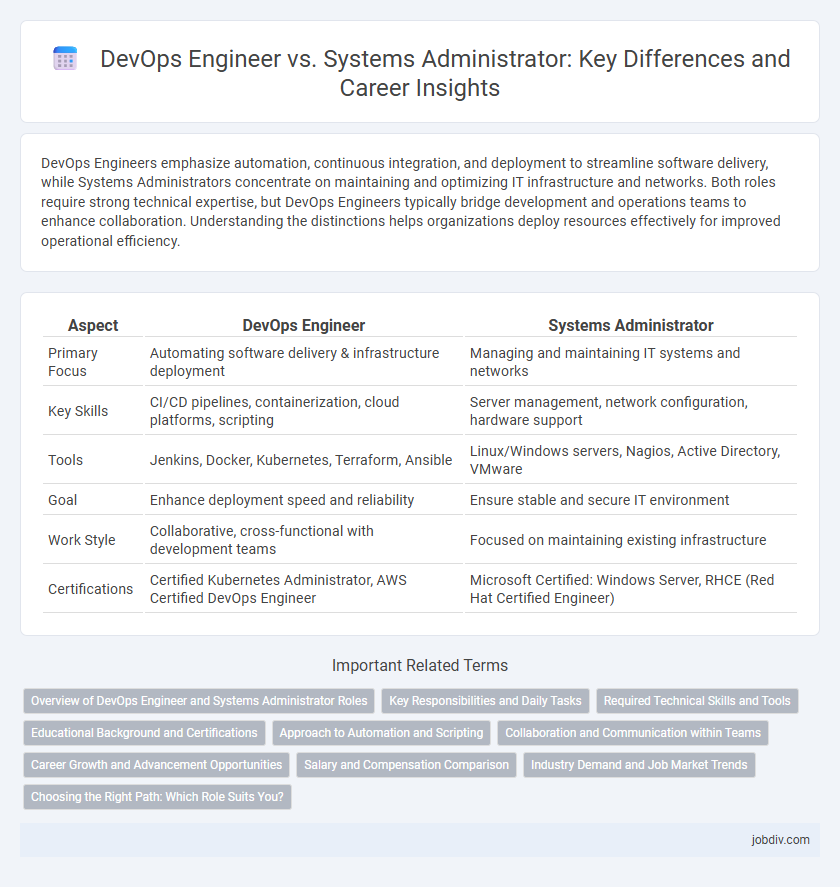DevOps Engineers emphasize automation, continuous integration, and deployment to streamline software delivery, while Systems Administrators concentrate on maintaining and optimizing IT infrastructure and networks. Both roles require strong technical expertise, but DevOps Engineers typically bridge development and operations teams to enhance collaboration. Understanding the distinctions helps organizations deploy resources effectively for improved operational efficiency.
Table of Comparison
| Aspect | DevOps Engineer | Systems Administrator |
|---|---|---|
| Primary Focus | Automating software delivery & infrastructure deployment | Managing and maintaining IT systems and networks |
| Key Skills | CI/CD pipelines, containerization, cloud platforms, scripting | Server management, network configuration, hardware support |
| Tools | Jenkins, Docker, Kubernetes, Terraform, Ansible | Linux/Windows servers, Nagios, Active Directory, VMware |
| Goal | Enhance deployment speed and reliability | Ensure stable and secure IT environment |
| Work Style | Collaborative, cross-functional with development teams | Focused on maintaining existing infrastructure |
| Certifications | Certified Kubernetes Administrator, AWS Certified DevOps Engineer | Microsoft Certified: Windows Server, RHCE (Red Hat Certified Engineer) |
Overview of DevOps Engineer and Systems Administrator Roles
DevOps Engineers focus on automating and streamlining software development and IT operations to enhance continuous integration, delivery, and deployment processes. Systems Administrators manage, configure, and maintain computer systems and networks, ensuring system stability, security, and performance. Both roles require strong technical skills, but DevOps Engineers emphasize collaboration between development and operations, while Systems Administrators concentrate on infrastructure management and troubleshooting.
Key Responsibilities and Daily Tasks
DevOps Engineers primarily focus on automating deployment pipelines, managing continuous integration/continuous delivery (CI/CD) processes, and collaborating with development teams to enhance software delivery speed and reliability. Systems Administrators handle the configuration, maintenance, and troubleshooting of servers, networks, and hardware infrastructure to ensure system stability and security. Both roles involve monitoring system performance and managing backups, but DevOps emphasizes automation and software lifecycle integration, whereas Systems Administrators concentrate on infrastructure management and operational support.
Required Technical Skills and Tools
DevOps Engineers require proficiency in continuous integration and continuous deployment (CI/CD) tools like Jenkins, Docker, Kubernetes, and configuration management platforms such as Ansible or Puppet. Systems Administrators focus on skills related to managing operating systems, network configurations, shell scripting, and infrastructure monitoring tools like Nagios or Zabbix. Both roles demand strong expertise in Linux/Unix environments, but DevOps Engineers emphasize automation and cloud platform skills, while Systems Administrators prioritize system stability and hardware management.
Educational Background and Certifications
DevOps Engineers typically hold degrees in computer science, software engineering, or information technology, with specialized certifications such as AWS Certified DevOps Engineer, Docker Certified Associate, and Certified Kubernetes Administrator enhancing their expertise in continuous integration and deployment practices. Systems Administrators often possess degrees in information systems, network management, or computer engineering, complemented by certifications like CompTIA Network+, Microsoft Certified Systems Administrator (MCSA), and Red Hat Certified System Administrator (RHCSA) that validate their skills in server management and network infrastructure. Both roles benefit from ongoing education in cloud technologies, automation tools, and security protocols to stay current in rapidly evolving IT environments.
Approach to Automation and Scripting
DevOps Engineers prioritize automation by developing continuous integration and continuous deployment (CI/CD) pipelines using tools like Jenkins, Ansible, and Terraform to streamline application delivery and infrastructure management. Systems Administrators focus on maintaining system stability and security through scripting languages such as Bash or PowerShell, automating routine tasks like backups and user management. The DevOps approach emphasizes collaborative workflows and infrastructure as code, whereas Systems Administrators traditionally rely on manual interventions supplemented by targeted scripts.
Collaboration and Communication within Teams
DevOps Engineers foster seamless collaboration through integrated development and operations practices, enhancing communication between software developers and IT teams to accelerate delivery cycles. Systems Administrators maintain robust infrastructure by effectively communicating system requirements and issues, ensuring stability and security within IT environments. Both roles require strong interpersonal skills, but DevOps emphasizes continuous feedback and cross-functional teamwork, while Systems Administrators focus on operational reliability and support communication.
Career Growth and Advancement Opportunities
DevOps Engineers experience accelerated career growth due to their expertise in automation, continuous integration, and cloud technologies, which are highly sought after in modern IT environments. Systems Administrators often have strong foundational skills and steady advancement prospects but may face limited upward mobility without adopting DevOps tools and practices. Transitioning from Systems Administrator to DevOps Engineer can significantly enhance career advancement opportunities by aligning with industry trends emphasizing agility and scalable infrastructure.
Salary and Compensation Comparison
DevOps Engineers typically command higher salaries than Systems Administrators due to their expertise in automation, continuous integration, and cloud infrastructure management, with average annual earnings ranging from $100,000 to $140,000 compared to $70,000 to $100,000 for Systems Administrators. Compensation packages for DevOps roles often include performance bonuses, stock options, and comprehensive benefits reflecting their critical role in accelerating software delivery and enhancing operational efficiency. Systems Administrators may receive steady base pay with fewer variable incentives, focusing on maintaining IT infrastructure stability and user support.
Industry Demand and Job Market Trends
DevOps Engineers are experiencing a significant rise in demand due to the industry's shift towards continuous integration and continuous delivery (CI/CD) pipelines, automation, and cloud-native applications. Systems Administrators remain essential for managing traditional IT infrastructure, but their demand is stabilizing as organizations adopt more automated and containerized environments. Current job market trends show higher salary growth and more openings for DevOps roles compared to Systems Administrators, reflecting the evolving priorities in IT operations and software development.
Choosing the Right Path: Which Role Suits You?
Choosing between a DevOps Engineer and a Systems Administrator depends on your interest in automation, continuous integration, and cloud infrastructure versus traditional IT management, server maintenance, and network administration. DevOps Engineers typically work with tools like Kubernetes, Jenkins, and Terraform to streamline development pipelines, while Systems Administrators focus on server configuration, security policies, and uptime monitoring. Assess your skills in scripting, collaboration, and process improvement to determine which role aligns with your career goals and technical strengths.
DevOps Engineer vs Systems Administrator Infographic

 jobdiv.com
jobdiv.com